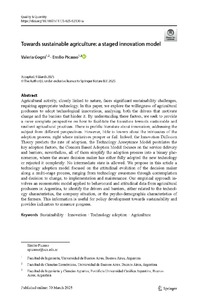Por favor, use este identificador para citar o enlazar este ítem:
https://repositorio.uca.edu.ar/handle/123456789/20029| Campo DC | Valor | Lengua/Idioma |
|---|---|---|
| dc.contributor.author | Gogni, Valeria | es |
| dc.contributor.author | Picasso, Emilio | es |
| dc.coverage.spatial | Argentina | es |
| dc.date.accessioned | 2025-07-07T18:06:12Z | - |
| dc.date.available | 2025-07-07T18:06:12Z | - |
| dc.date.issued | 2025 | - |
| dc.identifier.uri | https://repositorio.uca.edu.ar/handle/123456789/20029 | - |
| dc.description.abstract | Agricultural activity, closely linked to nature, faces significant sustainability challenges, requiring appropriate technology. In this paper, we explore the willingness of agricultural producers to adopt technological innovations, analysing both the drivers that motivate change and the barriers that hinder it. By understanding these factors, we seek to provide a more complete perspective on how to facilitate the transition towards sustainable and resilient agricultural practices. There is prolific literature about innovation, addressing the subject from different perspectives. However, little is known about the intricacies of the adoption process, right where initiatives prosper or fail. Indeed, the Innovation Diffusion Theory predicts the rate of adoption, the Technology Acceptance Model postulates the key adoption factors, the Concern Based Adoption Model focuses on the service delivery and barriers; nevertheless, all of them simplify the adoption process into a binary phenomenon, where the aware decision maker has either fully adopted the new technology or rejected it completely. No intermediate state is allowed. We propose in this article a technology adoption model focused on the attitudinal evolution of the decision maker along a multi-stage process, ranging from technology awareness through contemplation and decision to change, to implementation and maintenance. Our empirical approach involves an econometric model applied to behavioural and attitudinal data from agricultural producers in Argentina, to identify the drivers and barriers, either related to the technology characteristics, the company situation, or the psycho-demographic characteristics of the farmers. This information is useful for policy development towards sustainability and provides indicators to measure progress. | es |
| dc.format | application/pdf | es |
| dc.language.iso | spa | es |
| dc.publisher | Springer | es |
| dc.rights | Atribución-NoComercial-CompartirIgual 4.0 Internacional | * |
| dc.rights.uri | http://creativecommons.org/licenses/by-nc-sa/4.0/ | * |
| dc.source | Quality & Quantity. 2025. | es |
| dc.subject | AGRICULTURA | es |
| dc.subject | SOSTENIBILIDAD | es |
| dc.subject | INNOVACION TECNOLOGICA | es |
| dc.title | Towards sustainable agriculture: a staged innovation model | es |
| dc.type | Artículo | es |
| dc.identifier.doi | 10.1007/s11135-025-02130-w | - |
| uca.issnrd | 0 | es |
| uca.affiliation | Fil: Gogni, Valeria. Universidad de Buenos Aires; Argentina | es |
| uca.affiliation | Fil: Picasso, Emilio. Universidad de Buenos Aires; Argentina | es |
| uca.affiliation | Fil: Picasso, Emilio. Pontificia Universidad Católica Argentina. Facultad de Ingeniería y Ciencias Agrarias; Argentina | es |
| uca.version | publishedVersion | es |
| item.fulltext | With Fulltext | - |
| item.grantfulltext | mixedopen | - |
| item.languageiso639-1 | es | - |
| Aparece en las colecciones: | Artículos | |
Ficheros en este ítem:
| Fichero | Descripción | Tamaño | Formato | Login |
|---|---|---|---|---|
| towards-sustainable-agriculture.pdf | 793,56 kB | Adobe PDF | SOLICITAR ACCESO | |
| towards-sustainable-agriculture.jpg | 263,42 kB | JPEG |  Visualizar/Abrir |
Este ítem está sujeto a una Licencia Creative Commons

